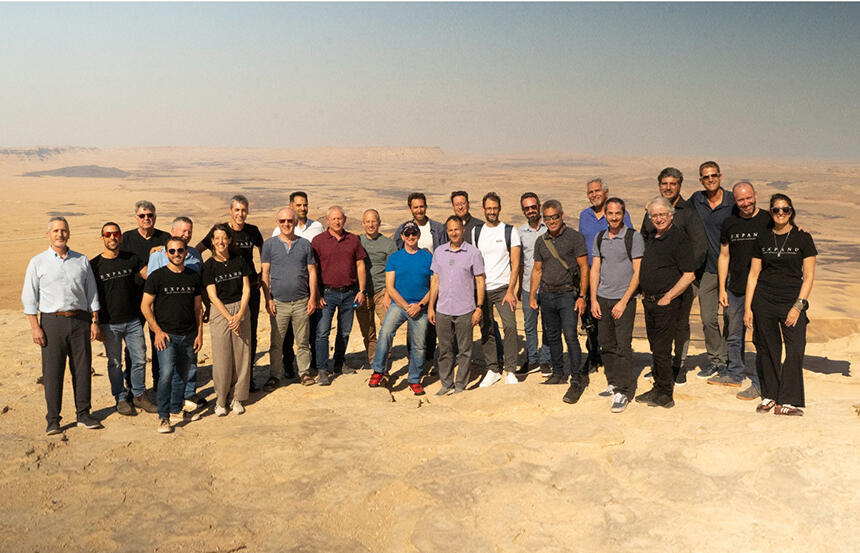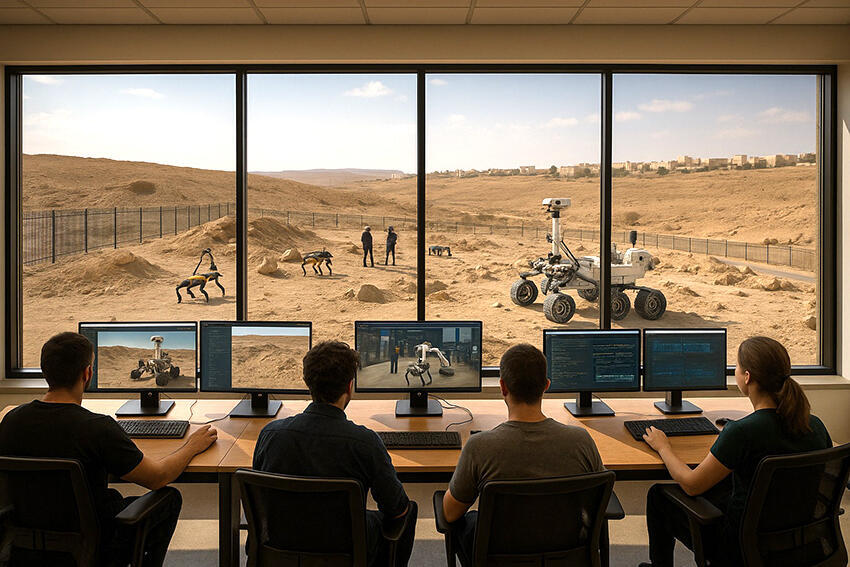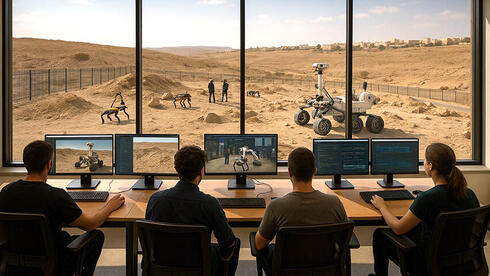Just before the outbreak of the war with Iran, ten Israeli startups participated in a unique event for the local market: an intensive “Space Bootcamp” by Creation-Space in Mitzpe Ramon. The event aimed to help these companies integrate into the global space industry and secure development grants for their technologies.
This meeting in Mitzpe Ramon marks the first stage of Creation-Space’s accelerator program, which offers investments of up to $250,000 per company, contingent upon meeting certain targets. The funding is provided by the American investment firm CreationsVC.
2 View gallery


(Photo: Kamila – The Set Studio)
The selected companies all possess “dual value,” meaning they develop products or technologies for use on Earth—primarily in sustainability-related fields—that can also be adapted for space, with a focus on deep space missions.
For example, Arbell Energy is developing ultra-thin, lightweight solar panels based on nanomaterials, which can be deployed as sheets to convert any surface into an energy source. These panels could also work in space, and due to their light weight, they significantly reduce spacecraft mass, saving considerable fuel for launches and operations.Another example is 3DSil, which has developed 3D printing technology for creating complex products from silicon and advanced materials. While this technology is currently intended for custom medical implants on Earth, it could be adapted for 3D printing on the Moon or Mars using local materials for various applications.This marks the second cohort in Creation-Space’s accelerator program, which has been significantly upgraded from last year’s inaugural cohort, which included five companies—only one of which received a scientific grant.
“The main innovation here is laying the cornerstone for a campus dedicated to research, development, and entrepreneurship of dual-use solutions for both Earth and space,” said Dr. Roy Naor, CEO of Creation-Space, in an interview with the Davidson Institute website. “This is a milestone in the realization of the vision for establishing a space city in Mitzpe Ramon.”
The bootcamp training included meetings with space experts and investors, along with a tour of the Ramon Crater. Bootcamp participants at the crater’s edge | Photo: Kamila – The Set Studio
Building companies
The program’s initial meeting, or “bootcamp” (referred to as “basic training” by the company), spanned three intense days, with representatives from ten companies selected from over a hundred applicants.
“This was an introductory course to the space industry. Most of these companies had not previously been involved in space activities. We introduced them to the field, facilitated meetings with experts, and arranged a video call with investors from the United States. Additionally, they toured the Ramon Crater to learn about its advantages as an analog environment for planetary research,” Naor explained.
“The program lasts three months, during which we help the companies raise investments and secure grants from space agencies, the Israel Innovation Authority, and other organizations. We guide them, foster connections with key people and companies in the field, and encourage them to explore space opportunities without giving up their terrestrial activities.”
The companies accepted into the program received an initial investment of 50,000 dollars, with the remaining funds—up to a total of 250,000 dollars—to be awarded based on the achievement of program milestones and as matching funds against grants from other organizations.
“We continue to support the companies as needed even after the three months. In fact, two companies from the first cohort have advanced to the second cohort,” Naor emphasized.
“The ultimate goal is to build companies, and every company is a potential partner that we develop together.”
Paving the path to space leadership
Creation-Space’s vision aligns with that of Mitzpe Ramon to position itself as Israel’s “Space City.” The town is located on the edge of the Ramon Crater, which served as the site for an Israeli Mars analog mission in 2018, and later for an international mission as well.
“The idea is, as mentioned, to establish a space campus with a conference center, laboratories, classrooms, and more,” says Naor. “Companies developing products for extreme environments will be able to develop them here and immediately run pilot tests in this remote town. They can also take their projects into the field to test them in an environment analogous to the Moon and Mars.”
2 View gallery


(Illustration: Creation-Space)
In addition to the two previously mentioned companies, the program includes ELSSWAY, which is developing wireless charging technology for electric vehicles; NWPT, developing nano-robotic systems for in-situ resource extraction and water purification; Filo Systems, which is creating an AI system for efficient data compression, storage, and decentralized communication; Grafenika, whose technology enables the development of efficient, low-cost fuel cells; Tclimate, which is designing transparent dome-shaped agricultural structures with climate control, suitable for extreme environments; and Alumentry, which is developing technology for low-cost automated manufacturing of complex aluminum parts.Also joining the program are two companies that participated in the first cohort of the program: Oasix Energy, developing an efficient thermal energy storage system using advanced materials, and Inhayle, which is creating a method for continuous surface disinfection to prevent the spread of infections.
The program is guided by the Israel Space Agency within the Ministry of Innovation, Science, and Technology, with support from the Growth Administration in the Ministry of Economy and Industry.
Other partners in the program include JNF-USA, the Mirage Foundation Israel, the DeserTech and Climate Innovation Center in the Negev, Or Hof – Law, Architects 8200, Meitar – Patents, Amazon Web Services, Dead Sea and Desert R&D, and the Mitzpe Ramon Local Council.
The second cohort of the program launched just before the outbreak of the war with Iran, and according to Naor, this highlights the significance of the company’s activities.
“We had technological superiority over Iran because we developed it 10–15 years ago. From a business perspective, we are now building Israeli dual-use technological capabilities that will lay the foundation for future leadership in the deep-space market, which could potentially drive exponential economic growth at a national level.”
